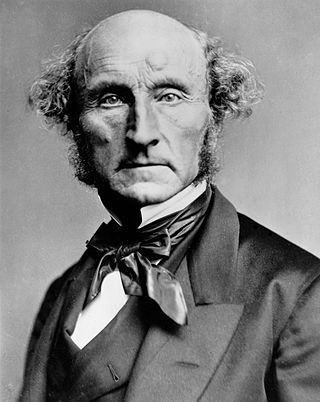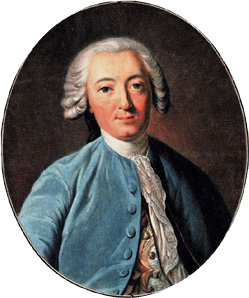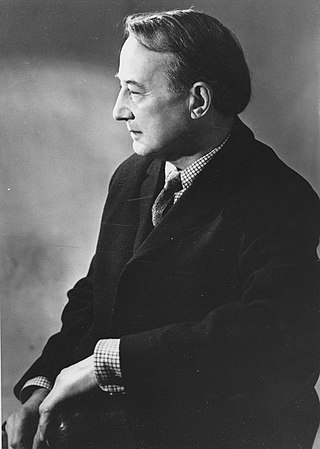
John Stuart Mill was an English philosopher, political economist, politician, and civil servant. One of the most-influential thinkers in the history of classical liberalism, he contributed widely to social theory, political theory, and political economy. Dubbed "the most influential English-speaking philosopher of the nineteenth century" by the Stanford Encyclopedia of Philosophy, he conceived of liberty as justifying the freedom of the individual in opposition to unlimited state and social control.

Jeremy Bentham was an English philosopher, jurist, and social reformer regarded as the founder of modern utilitarianism.

A thought experiment is a hypothetical situation in which a hypothesis, theory, or principle is laid out for the purpose of thinking through its consequences.
The panopticon is a design of institutional building with an inbuilt system of control, originated by the English philosopher and social theorist Jeremy Bentham in the 18th century. The concept is to allow all prisoners of an institution to be observed by a single security guard, without the inmates knowing whether or not they are being watched.

James Mill was a Scottish historian, economist, political theorist and philosopher. He is counted among the founders of the Ricardian school of economics. He also wrote The History of British India (1817) and was one of the prominent historians to take a colonial approach. He was the first writer to divide Indian history into three parts: Hindu, Muslim and British, a classification which has proved surpassingly influential in the field of Indian historical studies.

Claude Adrien Helvétius was a French philosopher, freemason and littérateur.
Critical thinking is the analysis of available facts, evidence, observations, and arguments in order to form a judgement by the application of rational, skeptical, and unbiased analyses and evaluation. The application of critical thinking includes self-directed, self-disciplined, self-monitored, and self-corrective habits of the mind, thus a critical thinker is a person who practices the skills of critical thinking or has been trained and educated in its disciplines. Richard W. Paul said that the mind of a critical thinker engages the person's intellectual abilities and personality traits. Critical thinking presupposes assent to rigorous standards of excellence and mindful command of their use in effective communication and problem solving, and a commitment to overcome egocentrism and sociocentrism.

Michael Joseph Oakeshott FBA was an English philosopher and political theorist who wrote about the philosophies of history, religion, aesthetics, education, and law.

Mass society is a concept that describes modern society as a monolithic force and yet a disaggregate collection of individuals. It is often used pejoratively to refer to a society in which bureaucracy and impersonal institutions have replaced some notion of traditional society, leading to social alienation.
Technocapitalism or tech-capitalism refers to changes in capitalism associated with the emergence of new technology sectors, the power of corporations, and new forms of organization. Technocapitalism is characterised by constant innovation, global competition, the digitisation of information and communication, and the growing importance of digital networks and platforms.

Lorenzo Magnani, is an Italian philosopher who teaches philosophy of science in the Department of Humanities, Philosophy Section, at the University of Pavia, former full professor and director of the Computational Philosophy Laboratory. He has been (2006/2012) visiting professor at the Sun Yat-sen University in China. In the event of the 50th anniversary of the re-building of the Philosophy Department of Sun Yat-sen University in 2010, an award was given to him to acknowledge his contributions to the areas of philosophy, philosophy of science, logic, and cognitive science.
The International Library of Psychology, Philosophy and Scientific Method was an influential series of monographs published from 1922 to 1965 under the general editorship of Charles Kay Ogden by Kegan Paul, Trench Trubner & Co. in London. This series published some of the landmark works on psychology and philosophy, particularly the thought of the Vienna Circle in English. It published some of the major psychologists and philosophers of the time, such as Alfred Adler, C. D. Broad, Rudolf Carnap, F. M. Cornford, Edmund Husserl, Carl Jung, Kurt Koffka, Ernst Kretschmer, Bronisław Malinowski, Karl Mannheim, George Edward Moore, Jean Nicod, Jean Piaget, Frank P. Ramsey, Otto Rank, W. H. R. Rivers, Louis Leon Thurstone, Jakob von Uexküll, Hans Vaihinger, Edvard Westermarck, William Morton Wheeler, Ludwig Wittgenstein, J. N. Findlay and others. Most of the 204 volumes in the series have been reprinted, some in revised editions.
Traditionalist conservatism, often known as classical conservatism, is a political and social philosophy that emphasizes the importance of transcendent moral principles, manifested through certain natural laws to which society should adhere prudently. Traditionalist conservatism is based on Edmund Burke's political views. Traditionalists value social ties and the preservation of ancestral institutions above excessive individualism.

Ipse dixit is an assertion without proof, or a dogmatic expression of opinion.

British philosophy refers to the philosophical tradition of the British people. "The native characteristics of British philosophy are these: common sense, dislike of complication, a strong preference for the concrete over the abstract and a certain awkward honesty of method in which an occasional pearl of poetry is embedded".
The philosophy of human rights attempts to examine the underlying basis of the concept of human rights and critically looks at its content and justification. Several theoretical approaches have been advanced to explain how and why the concept of human rights developed.

The Spirit of the Age is a collection of character sketches by the early 19th century English essayist, literary critic, and social commentator William Hazlitt, portraying 25 men, mostly British, whom he believed to represent significant trends in the thought, literature, and politics of his time. The subjects include thinkers, social reformers, politicians, poets, essayists, and novelists, many of whom Hazlitt was personally acquainted with or had encountered. Originally appearing in English periodicals, mostly The New Monthly Magazine in 1824, the essays were collected with several others written for the purpose and published in book form in 1825.
Philosophy of architecture is a branch of philosophy of art, dealing with aesthetic value of architecture, its semantics and relations with development of culture.
Technological determinism is a reductionist theory that assumes that a society's technology progresses by following its own internal logic of efficiency, while determining the development of the social structure and cultural values. The term is believed to have originated from Thorstein Veblen (1857–1929), an American sociologist and economist. The most radical technological determinist in the United States in the 20th century was most likely Clarence Ayres who was a follower of Thorstein Veblen and John Dewey. William Ogburn was also known for his radical technological determinism and his theory on cultural lag.
James Henderson Burns was a Scottish historian of medieval and modern political thought who also studied utilitarianism and Jeremy Bentham.